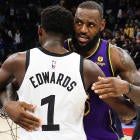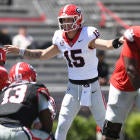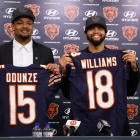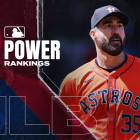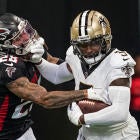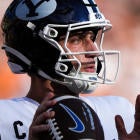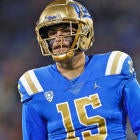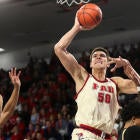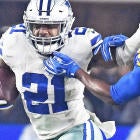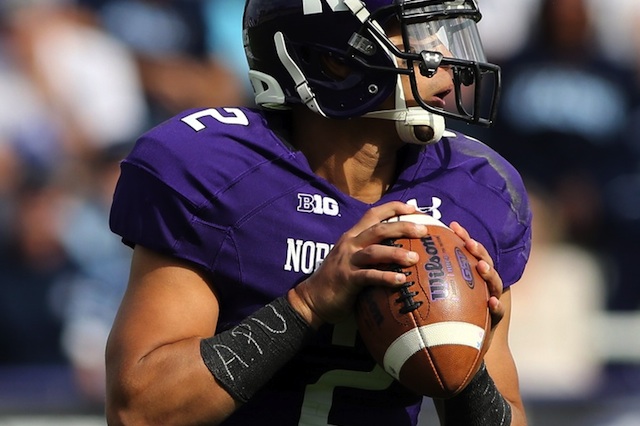
Fowler: Long ignored by NCAA, players ready for a fight
Kain Colter and a group of Northwestern players are beginning the process of forming a labor union to represent college athletes.
According to ESPN's Outside the Lines, Ramogi Huma, president of the National College Players Association, filed a petition in Chicago on behalf of the players with the National Labor Relations Board.
If the group is certified by the NLRB, it will be called the College Athletes Players Association (CAPA). Huma, Colter and former UMass basketball player Luke Bonner created the group with support from the United Steelworkers.
"This is about finally giving college athletes a seat at the table," said Huma, a former UCLA linebacker, who created the NCPA as an advocacy group in 2001. "Athletes deserve an equal voice when it comes to their physical, academic and financial protections."
Huma told "Outside The Lines" that the move to unionize players at Northwestern started with quarterback Kain Colter, who reached out to him last spring and asked for help in giving athletes representation in their effort to improve the conditions under which they play NCAA sports. Colter became a leading voice in regular NCPA-organized conference calls among players from around the country.
Huma, Colter and the NCPA organized the "All Players United" movement in the 2013 season that resulted in several players from Northwestern, Georgia and Georgia Tech displaying #APU on their uniforms.
Huma told OTL that the goals of CAPA will be the same as the NCPA; looking for representation in the decision-making process of college athletics to improve conditions for student-athletes. The group has advocated for multi-year scholarships and has called for guaranteed scholarships for players who can no longer compete due to injury or medical issues.
"A lot of people will think this is all about money; it's not," Colter told the Chicago Tribune on Tuesday morning. "We're asking for a seat at the table to get our voice heard."
Colter to Trib on unionizing: “We’re not expecting a decision to be made right away. It might ... go all the way to the Supreme Court.”
— Teddy Greenstein (@TeddyGreenstein) January 28, 2014
Leaders of the NCPA and CAPA will hold a press conference Tuesday in downtown Chicago to discuss the petition and unionization efforts.
According to NCPAnow.org, the group has 11 specific goals.
1. Minimize college athletes' brain trauma risks.
2. Raise the scholarship amount.
3. Prevent players from being stuck paying sports-related medical expenses.
4. Increase graduation rates.
5. Protect educational opportunities for student-athletes in good standing.
6. Prohibit universities from using a permanent injury suffered during athletics as a reason to reduce/eliminate a scholarship.
7. Establish and enforce uniform safety guidelines in all sports to help prevent serious injuries and avoidable deaths.
8. Eliminate restrictions on legitimate employment and players ability to directly benefit from commercial opportunities.
9. Prohibit the punishment of college athletes that have not committed a violation.
10. Guarantee that college athletes are granted an athletic release from their university if they wish to transfer schools.
11. Allow college athletes of all sports the ability to transfer schools one time without punishment.
Previously, the NCPA flew a banner over the Rose Bowl before the BCS National Championship game that read "All Players United for Concussion Reform. Wake Up NCAA!"
The NCAA responded Tuesday, in a statement from Donald Remy, chief legal officer: "This union-backed attempt to turn student-athletes into employees undermines the purpose of college: an education. Student-athletes are not employees, and their participation in college sports is voluntary. We stand for all student-athletes, not just those the unions want to professionalize.
"Many student athletes are provided scholarships and many other benefits for their participation. There is no employment relationship between the NCAA, its affiliated institutions or student-athletes.
"Student-athletes are not employees within any definition of the National Labor Relations Act or the Fair Labor Standards Act. We are confident the National Labor Relations Board will find in our favor, as there is no right to organize student-athletes."
Northwestern subsequently issued its own statement, saying in part: "We are pleased to note that the Northwestern students involved in this effort emphasized that they are not unhappy with the University, the football program or their treatment here, but are raising the concerns because of the importance of these issues nationally.
"Northwestern believes that our student-athletes are not employees and collective bargaining is therefore not the appropriate method to address these concerns. However, we agree that the health and academic issues being raised by our student-athletes and others are important ones that deserve further consideration."













